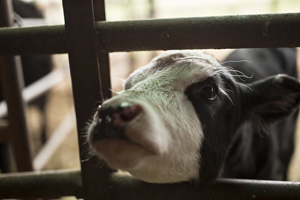The crisis in organic dairy is ongoing, with many family scale organic farms barely staying afloat or already out of business.
 |
Ethical farmers believe this crisis is perpetuated by differing applications of the “origin of livestock” rules in the organic standards. And some certifiers do appear to allow their dairy clients to game the system.
Offending dairies sell their certified organic calves for top dollar and buy cheap conventional heifers that are transitioned to organic over one year. This practice gives dairies a financial leg up because it allows them to sell the organic milk produced, instead of feeding it to baby calves.
The long-awaited Organic Livestock and Poultry Practices rule would have clarified this issue in 2018, but that proposed rule was withdrawn by the Trump administration, apparently in favor of agribusiness interests. A final rule remains on the horizon, despite dire reports from authentic organic dairy farmers.
Dairy consumers can help by using Cornucopia’s Organic Dairy Scorecard to support ethical family farmers.
Interested readers who want to learn more about the origin of livestock issue can also check out Cornucopia’s comprehensive report: The Industrialization of Organic Dairy.
Small Organic Dairy Farmers Say the Rules are Stacked Against Them. One Rule in Particular.
The Origin of Livestock rule is being applied in different ways by different certifiers, which producers and advocates say gives an unfair advantage to large dairies.
Civil Eats
by Lisa Held
Organic dairy farmers are often isolated and don’t get to connect to each other, said Liz Pickard, a farmer at Twin Oaks Dairy in Truxton, New York. But right now, when they do, the National Organic Program’s (NOP) “Origin of Livestock” rule is a hot topic.
“Everyone’s talking about it. It’s a huge deal,” she said on a recent phone call from her farm, as she cursed a stalled tractor. “This is probably one of the biggest things that’s putting a drag on the milk market right now.”
Just like crops cannot be certified organic until the soil they’re grown in has been under organic management for three years, the Origin of Livestock provision was included in the United States Department of Agriculture (USDA) organic regulations to specify how long an animal must be under organic management before its milk can be called organic. But many farmers say the rule is being interpreted differently by different certifiers, putting small, family-owned dairies at a disadvantage.
While the provision requires livestock to be raised organically since before birth, it offers a one-time exception for farmers who want to convert a conventional herd.
The controversy is over that exception—farmers say some certifiers allow large, industrial organic dairies to repeatedly add cheaper-to-feed, conventionally raised calves to their herds and then convert them to organic over a shorter time period. Able to grow their herds quickly and inexpensively, small farmers say the dairies that operate this way flood the market with cheap milk, undercutting dairies that are held to a different standard.

